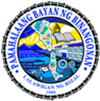Binangonan, Rizal
| Binangonan | ||
|---|---|---|
| Municipality | ||
 |
||
|
||
 Map of Rizal showing the location of Binangonan |
||
| Location within the Philippines | ||
| Coordinates: 14°27′05″N 121°11′31″E / 14.4514°N 121.1919°ECoordinates: 14°27′05″N 121°11′31″E / 14.4514°N 121.1919°E | ||
| Country |
|
|
| Region | CALABARZON (Region IV-A) | |
| Province | Rizal | |
| District | 1st District of Rizal | |
| Founded | 1766 | |
| Barangays | 40 | |
| Government | ||
| • Mayor | Cesar M. Ynares | |
| Area | ||
| • Total | 66.34 km2 (25.61 sq mi) | |
| Elevation | 75.28 m (246.98 ft) | |
| Population (2015 census) | ||
| • Total | 282,474 | |
| • Rank | 4th out of 1,489 Municipalities | |
| • Density | 4,300/km2 (11,000/sq mi) | |
| Time zone | PST (UTC+8) | |
| ZIP code | 1940 | |
| IDD : area code | +63 (0)2 | |
| Income class | 1st class, urban | |
| Website | www |
|
Binangonan is a first class urban municipality in the province of Rizal, Philippines. According to the 2015 census, it has a population of 282,474 people.
A thriving fish port and fishing industry is found in Binangonan, having a long coast line facing the Laguna de Bay, including the western part of Talim Island. The plant of Rizal Cement and Grandspan are in Binangonan as well. Their main livelihood are fishing and farming.
With the continuous expansion of Metro Manila, the municipality is now part of Manila's conurbation which reaches Cardona in its easternmost part.
Binangonan is politically subdivided into 40 barangays, of which 23 are on the mainland and 17 are island barangays.
It is claimed that the binañgonan means “the first town established along the lake”, in reference to a legend that tells of how the towns around Laguna de Baý were named. More likely however is that binañgonan refers to a place from where someone or something rose, which is precisely what binangunan in Filipino means.
A first class municipality, Binangonan lies between the foothills of Sierra Madre and the shores of Laguna de Bay. It is composed of 23 mainland and 17 island barangays.
This town was separated and became an independent parish in 1621 through the initiatives of the Franciscan missionaries. The town was established in 1737 and conquered by the Spaniards in 1763. It became a town in 1900 during the American colonial period. Binangonan’s major historical landmark is the 200-year-old Santa Ursula Parish, located at the heart of the town. Binangonan is a major supplier of freshwater fishes from Laguna de Bay like dulong, ayungin, biya, kanduli, and gurami to Metro Manila, Laguna, Cavite and Batangas.
Through the initiative of then Congressman, Gilberto M. Duavit, bestowed most of his Congressional funds for education and related structural facilities with the support of then Gov. Casimiro M. Ynares, Jr., former Mayor Cesar M. Ynares and incumbent Mayor Boyet M. Ynares, Binangonan obtained the title as “The Education Center of Rizal.” This recognition was achieved by the existence of Rizal National Science High School, the University of Rizal System, and the Technical Education Skills Development Authority (TESDA) center, educational institutions that secure and offer quality education to Rizal’s inhabitants where even the less fortunate can achieve quality education including technical and vocational knowledge. Binangonan’s major source of income comes from agriculture, where 49 percent of its total land area are devoted to agriculture and livestock industries, while the source of income of residents in its coastal barangays are mainly fishing and aquaculture industry. Other sources of income come from manufacturing, commercial establishments, real estate, and public utility services.
...
Wikipedia


